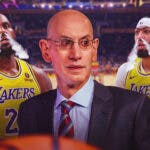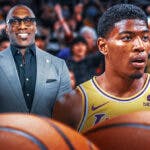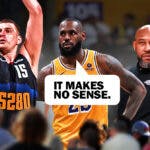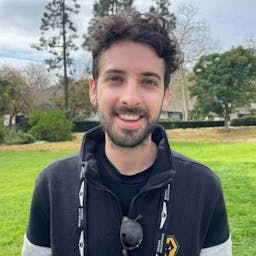The 2021-22 Los Angeles Lakers will go down as one of the loudest failures in NBA history. Even worse, their 33-win campaign marked the culmination of a voluntary two-year roster overhaul following the utmost validation of successful roster-building: an NBA championship, achieved by a team with depth, a mix of old and young, two definable stars, a plethora of under-contract two-way role players, and chemistry.
Now, the Lakers are without direction, answers, identity, trade assets, financial flexibility, and a head coach. Whoops.
Heading into this summer, they'll be forced to reconstruct the group once again — and perhaps the coaching staff, front office, and other departments, as well (there has been alarming churn throughout the organization in recent years. The team has already made a notable change to the training staff.)
So, with the NBA playoffs in full swing — and each game serving as a reminder of what the Lakers weren't — let's set the table with the 10 most pressing questions facing Jeanie Buss, Rob Pelinka, and Co.
https://open.spotify.com/episode/66umzZybph3Q6DrDEqCgVr?si=8fb8c81451c84051
1) Who is making decisions?
The apparent dysfunction in the Lakers front office mirrored the on-court product. Who actually had Final Cut? Jeanie? Rob? Kurt? Linda? LeBron? AD? Rich? Jesse? Joey? Magic? Phil? Certainly, it wasn't Frank.
At their post-exit-interviews-press conferences, the Lakers, for once, seemed in alignment on a message: It's Pelinka's show. LeBron James, four or five times, attempted to distance himself from upcoming front office moves. Pelinka, fresh off scapegoating Frank Vogel, said he — no one else, including Jeanie — was responsible for basketball decisions (though he did mention Kurt Rambis, Joey Buss, Jesse Buss, LeBron, and Anthony Davis as close collaborators).
Before the Lakers make any impactful decisions, they need to sort out who is influencing the big calls, and to what degree. How much power LeBron, AD and Klutch continue to wield — or be allowed to wield — is one of the defining questions facing the franchise.
2) Who will be the head coach? And will they give him his damn respect?
First on the offseason to-do list is finding a new head coach. Pelinka said the Lakers will make a hire before the June 23rd NBA Draft. He said the Lakers are looking for a “strong voice” who will command the respect of stars and veterans.
We'll see whether the Lakers' treatment of Vogel — a lame-duck one-year extension after winning a title after a low-ball offer in the first place, not giving him any say in his assistants, leaking his near-firing, leaking his actual firing — and prior coaches (see: Walton, Luke) will turn other coaches off.
Some rumored candidates: Quin Snyder, Doc Rivers, Nick Nurse (ideal, but unrealistic), Terry Stotts, Mark Jackson, Mike Brown, Scott Brooks, Ryan Jensen, Steve Clifford, Darvin Ham.
The splashiest hire would come from the college ranks — Jay Wright, John Calipari, Juwan Howard — but neither has expressed interest in taking an NBA job as soon as next season (Wright didn't rule eventually giving it a shot.)
A couple of outside-the-box candidates: Rajon Rondo, Jared Dudley.
3) What about the assistants?
The Lakers' reshuffling of their coaching staff was an underrated subplot of last summer. Instead of ponying up a few extra funds to retain Lionel Hollins or bring in Brooks — Westbrook's closest coaching ally — the team hired David Fizdale and promoted the coach (Mike Penberthy) in charge of shooting, a season after the Lakers struggled to make 3s.
It's hard to precisely assess blame, but Vogel's staff undeniably underperformed. Their clashing was Westbrook was a hindrance from “Day 1.”
Los Angeles reportedly plans to retain the staff. Frankly, this team could use as much continuity as possible, though you wonder if a prospective head coach would want some influence over the bench.
4) Can they participate in draft stuff?
The Lakers have no first-rounder (AD trade). They don't have a second-round pick, either, thanks to that Isaac Bonga-Jemerrio Jones-Mo Wagner blockbuster. However, as we witnessed with Austin Reaves, the Lakers — and their vaunted scouting department — will appeal to undrafted free agents. Perhaps they can maneuver into the second round.
5) Can they find a trade partner for Russell Westbrook? If not, then what?
Ultimately, Russ' fate is the most important storyline of the offseason.
Westbrook has until June 29 to opt into his player option, which he has 47 million reasons to do.
All signs point to divorce. On exit interview day, Pelinka implied that Russ was not a part of the team's future. Reporting has indicated that there is little to no chance he returns.
Beyond the poor basketball fit, the negative vibes that orbited him last season — exemplified by his delusional and salty exit interview press conference (in which he took shots at everybody, including LeBron and AD) — were palpable. At one point, Westbrook said he didn't want his family at home games and didn't care about the Lakers fans.
On and off the court, getting rid of Westbrook is addition by subtraction.
The Lakers will have to pay at least one first-round pick (they have '27 and '29 to deal) to entice a team to take on Westbrook's expiring deal. Best case scenario: they acquire decent vets on less-than-ideal contracts (Malcolm Brogdon/Buddy Hield, John Wall, Gordon Hayward/Terry Rozier) in return. So be it. LeBron is entering his 20th season. Losing the picks will hurt, but they have half a decade to get one back (they do have first-round picks before then, just not currently tradable ones). If all goes right, those picks won't be that valuable, anyway, and one or two productive role players around a healthy LeBron and AD could make a difference in next year's title race.
The other trade option is convincing a team with cap space (OKC, San Antonio, Orlando, Portland, Detroit) to absorb his contract, but that will likely cost two first-rounders. Otherwise, the Lakers will have to take back at least $36 million if Russ is traded before June 30, or $37.7 million after July 1 (he can't be dealt until he picks up the option).
If no trade materializes, they have three options, assuming him playing basketball in purple-and-gold is off the table:
- They can waive and stretch his remaining salary over the next three seasons. It would sting in a couple of years, but would get them under the luxury tax and free up money to improve their depth. They would be able to use the full nontaxpayer midlevel exception ($10.3M).
- They can write a hefty buyout check.
- They can send him home for a year and eat the money, a la Wall.
https://open.spotify.com/episode/21QRxLKNhDpRHfDVmhJ7IY?si=f129736aab17490f
6) Will LeBron sign the extension?
LeBron, with one year left on his deal, is eligible to sign a two-year, $97.1 million max extension on Aug. 4. He has until June 2023 to sign it. According to The Athletic's Sam Amick, LeBron may opt to forego the extension and return to playing on one-year deals, as he did in his prior stops.
If the Lakers navigate a satisfactory coaching search and free agency period, LeBron may be more inclined to reward them by putting pen to paper. At exit interviews, Pelinka said he believed LeBron was committed to the Lakers for the long haul. LeBron strategically dodged the question.
7) Who will come back?
LeBron, AD, Talen-Horton-Tucker, Reaves (team option), Stanley Johnson (team option), and Wenyen Gabriel (team option) are signed through 2022-23 or beyond. The Lakers have until late June to pick up the options but all three should return, considering their youth and contributions last season.
Kendrick Nunn said he will pick up his $5.3 million player option. Not counting the two two-way spots, there are eight spots left to fill with limited resources.
THT and Nunn remain trade candidates — either as sweeteners in a Russ deal or as individual chips to bolster depth. But, THT's stagnant development in 2021-22 was worrisome, and his player-option for 2023-24 renders him far less valuable on the trade market than he would have been one year ago. Nunn didn't play all season.
Carmelo Anthony is a solid bet to return. He'll cost the minimum, enjoys Los Angeles, and is close with LeBron. He was a relatively reliable player who was beloved in the locker room. Dwight Howard said he wants to return, though he's only an occasional rotation player at this point. D.J. Augustin, a late-season addition, had some nice moments, and his shooting and experience running point is useful.
Mac McClung (G-League Rookie of the Year) and Mason Jones (3rd in G-League MVP voting) impressed in South Bay.
The big question is…
8) Can they retain Malik Monk?
Monk's breakout season makes him harder to keep. The 24-year-old swingman could be in line for $10 million per season. Monk has stated his desire to stay in Los Angeles and repeatedly expressed his gratitude to the organization for taking a chance on him, but the Lakers will only be able to offer either the taxpayer mid-level exception ($6.3 million) or non-taxpayer MLE (as stated above).
Plus, they have greater positions of need than two-guard. That money may have to be allocated elsewhere.
9) Free agency targets?
The Lakers can hand out the MLE, biannual exception (about $4 million), and vet minimums.
They'll need to learn from their mistakes and avoid filling out their bench with prideful vets. Rajon Rondo, Kent Bazemore, DeAndre Jordan, Trevor Ariza, and Wayne Ellington provided next to nothing, and some were irked by being out of the rotation (Howard, too, at times). If they're going to dish out minimum deals, they might as well go young.
Positionally, the Lakers should prioritize a rangy/athletic 3-and-D wing (easier said than done). They'll also need a backup center (Gabriel?) and point guard (Augustin?). Defense has to be addressed.
We'll dive into free agent targets in the weeks ahead, but here are a few names to watch: T.J. Warren, Robert Covington, Thaddeus Young, Hassan Whiteside, Joe Ingles, Kris Dunn, Bruce Brown, Nicolas Batum, P.J. Tucker, Otto Porter Jr., Lou Williams.
10) How will LeBron and AD recover and train?
AD's physical transformation was the talk of last summer around the team. Davis determinedly bulked up to shed his (unfair) “soft” label and in anticipation of playing more center. But he seemed to put on too much upper body weight, which dragged his explosion and affected his jumper. In January, he apparently asked Jared Dudley how to slim down while injured.
Davis refuted any notion that he's injury-prone. He chalked his ailments up to bad luck. That may be true, but AD's weight could have hindered his elevation and nimbleness. He needs to rejigger his offseason training approach, once again.
As for LeBron, he said his sore left knee will need extended rest to fully heal, and his sprained left ankle will need multiple weeks to recover. He also had after-season appointments on his knee and groin. LeBron's fitness is never in question — he shows up ready — but how his body recuperates at age 38 will be paramount.




